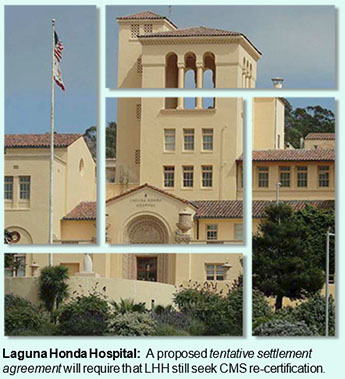 October 21, 2022
October 21, 2022City Attorney Alleged LHH Should Not Need Recertification, But …
LHH Settlement Agreement Requires Re-certification
 October 21, 2022
October 21, 2022
City Attorney Alleged LHH Should Not Need Recertification, But …
LHH Settlement Agreement Requires Re-certification
City Attorney’s Legal Defenses Were “Dead to Rights,”
But Then He Rolled Over and Played Dead
by Patrick Monette-Shaw
The proposed settlement involving Laguna Honda Hospital (LHH) that requires the San Francisco Health Commission, Board of Supervisors, and Mayor London Breed approve is a smokey backroom political deal that required San Francisco City Attorney David Chiu to drop his Federal lawsuit and the three administrative appeals he had filed naming U.S. Department of Health and Human Services secretary Xavier Becerra in exchange for the settlement agreement, is a grave, costly mistake!
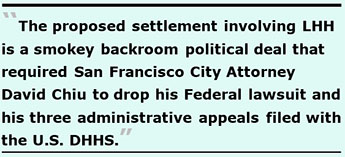 Why is it that after first saying LHH should not have to face re-certification, Chiu then did an about face and agreed to drop both his Federal lawsuit and the three administrative appeals that only essentially delays LHH applying for re-certification?
Why is it that after first saying LHH should not have to face re-certification, Chiu then did an about face and agreed to drop both his Federal lawsuit and the three administrative appeals that only essentially delays LHH applying for re-certification?
The settlement agreement is shrouded in secrecy and is not a transparent process shared openly with members of the public.
City Attorney’s Legal Filing Efforts
What is known and open to the public are Chiu’s diligent efforts filing his three appeals and his Federal lawsuit.
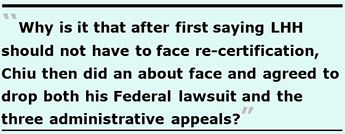 Federal Lawsuit in U.S. District Court
Federal Lawsuit in U.S. District Court
San Francisco City Attorney David Chiu’s Federal lawsuit — filed in United States District Court, Northern District of California on August 3, 2022 — clearly stated that LHH should not have to be re-certified at all, and that CMS had improperly terminated LHH’s provider participation agreement and federal funding. Chiu had written:
“Further, Laguna Honda should not need to be recertified at all. Laguna Honda has filed three successive administrative appeals challenging the Centers for Medicare & Medicaid Services’ (“CMS’s”) termination of the facility and the statement of deficiencies that led to CMS’s decision to terminate Laguna Honda as a Medicare and Medicaid provider. If Laguna Honda is successful in its administrative appeals, Laguna Honda will obtain an order finding that CMS improperly terminated Laguna Honda’s Medicare and Medicaid provider agreements, and restoring Laguna Honda as a Medicare and Medicaid provider.”
 Had Chiu prevailed with his Federal lawsuit, the entire fiasco would have come to an abrupt end and LHH would have been “made whole,” ending the complete dispute.
Had Chiu prevailed with his Federal lawsuit, the entire fiasco would have come to an abrupt end and LHH would have been “made whole,” ending the complete dispute.
Count One of Chiu’s lawsuit was titled “Violation of APA (5 U.S.C. § 706(2)(A) — Arbitrary and Capricious.”
The Administrative Procedure Act (APA) governs arbitrary and capricious conduct, which is defined as “willful and unreasonable action without consideration or regard for the facts and circumstances.” Arbitrary and capricious is a standard for judicial review and appeal, often seen in administrative law cases (such as the three administrative appeals Chiu had filed with the U.S. DHHS.).
The APA requires courts — including the U.S. District Court, Northern District of California — to “hold [as] unlawful and set aside” [any] agency action that is “arbitrary, capricious [or] an abuse of discretion,” which is what Chiu had alleged.
Count Two of Chiu’s lawsuit was titled “Violation of Procedural Due Process under the United States Constitution.” Chiu alleged CMS had terminated “Medicare and Medicaid reimbursements {to LHH] without just cause before the validity of Laguna Honda’s termination as a Medicare and Medicaid provider has been adjudicated through the administrative appeals process.” Therein, LHH was deprived of due process protections under the U.S. Constitution.
Chiu’s lawsuit concluded with a “Prayer For Relief” asking the District Court to “Issue an injunction requiring Defendants to extend Medicare and Medicaid funding to Laguna Honda until Laguna Honda’s administrative appeal is finally resolved …”
So, when the California Department of Public Health (CDPH) wrongly acted arbitrarily and capriciously by recommending that CMS terminate LHH’s Medicare and Medicaid provider agreement, and suspend all new admissions to LHH in April 2022, CDPH and CMS violated LHH’s due process protections under the U.S. Constitution.
 Then, Chiu did an about face and agreed to drop his assertion of due process violations in exchange for agreeing to the proposed smokey backroom deal settlement agreement on October 12, 2022. Why would he drop his sound Federal lawsuit? What was in it for the City or for LHH? What was in it for Chiu?
Then, Chiu did an about face and agreed to drop his assertion of due process violations in exchange for agreeing to the proposed smokey backroom deal settlement agreement on October 12, 2022. Why would he drop his sound Federal lawsuit? What was in it for the City or for LHH? What was in it for Chiu?
Administrative Appeals to U.S. DHHS
Chiu’s three administrative appeals to the U.S. DHHS Department Appeals Board were crystal clear: That he sought to have CMS’ survey findings and cited deficiencies reversed and rescinded, and sought to have LHH’s termination as a CMS provider reversed and overturned.
Chiu’s second appeal dated April 25, 2022 stated:
“For all of the reasons set forth herein [for an expedited Appeal], Laguna Honda respectfully requests that the DHHS, Departmental Appeals Board reverse CMS’ survey findings and imposition of remedies, including CMPs and DPNA between January 14, 2022 and February 2, 2022, related to CDPH’s findings and rescind the deficiencies under F689 issued under Statements of Deficiencies dated December 16, 2021 and January 21, 2022 …”
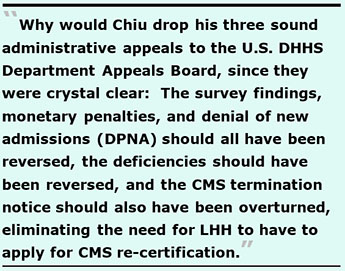 The acronym “CMPs” stands for Civil Monetary Penalties, and “DPNA” stands for Denial of Payment for New Admissions. It is thought CDPH and CMS had levied penalties of $409,000 against LHH, which Chiu believed were excessive and should have been reversed (overturned as fines improperly levied).
The acronym “CMPs” stands for Civil Monetary Penalties, and “DPNA” stands for Denial of Payment for New Admissions. It is thought CDPH and CMS had levied penalties of $409,000 against LHH, which Chiu believed were excessive and should have been reversed (overturned as fines improperly levied).
Chiu’s third appeal dated May 282, stated:
“CMS terminated Laguna Honda’s provider agreement as of April 14, 2022. This appeal challenges the notice of termination and seeks to reverse that termination because CMS based that six-month cycle on the flawed F689 deficiency tag finding. … Because a successful outcome to this appeal would mitigate the harm to those patients, Laguna Honda respectfully requests an expedited hearing.”
“CMS terminated Laguna Honda’s provider agreement as of April 14, 2022. This appeal challenges the notice of termination and seeks to reverse that termination because CMS based that six-month cycle on the flawed F689 deficiency tag finding. … Because a successful outcome to this appeal would mitigate the harm to those patients, Laguna Honda respectfully requests an expedited hearing.”
Again, why would Chiu drop his three sound administrative appeals to the U.S. DHHS Department Appeals Board, since they were crystal clear: The survey findings, monetary penalties, and denial of new admissions (DPNA) should all have been reversed, the deficiencies should have been reversed, and the CMS termination notice should also have been overturned, eliminating the need for LHH to have to apply for CMS re-certification with two CDPH re-certification 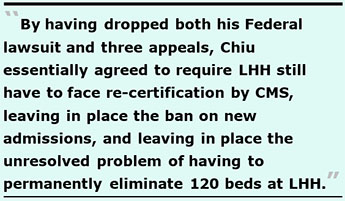 inspection surveys.
inspection surveys.
By having dropped both his Federal lawsuit and three appeals, Chiu essentially agreed to require LHH still have to face re-certification by CMS, leaving in place the ban on new admissions to LHH when patients are desperately seeking admission, and leaving in place the unresolved problem of having to permanently eliminate 120 beds at LHH.
What kind of deal with the Devil is this proposed settlement agreement, and why would Chiu agree to it?
Sudden Smokey Backroom Deal “Settlement Agreement”
The Westside Observer received an automated press release via e-mail from the California Department of Public Health (CDPH) Office of Public Affairs (OPA) on October 12 containing a joint statement between CMS, CDPH, and the City and County of San Francisco on developments related to Laguna Honda Hospital (LHH), indicating the three agencies had reached an “agreement in principle” to settle ongoing administrative proceedings and federal court litigation. It’s thought to be a tentative settlement agreement.
Later the same day, San Francisco City Attorney David Chew’s office issued the same joint statement press release, and San Francisco’s Department of Public Health (SFDPH) and LHH also issued the same press release.
The Joint Statement indicated LHH will be allowed to continue receiving Medicare and Medicaid reimbursements for LHH’s [current] patients through November 13, 2023.
The sudden proposed settlement agreement is contingent on LHH continuing to address quality improvements (known as Quality Assurance and Performance Improvement, or QAPI, measures) needed to ensure resident health and safety, while “aiming” to re-apply to participate in CMS ( i.e., to seek CMS re-certification). “Aiming” is a dubious term, at best, and not at all reassuring.
 The proposed agreement indicates transfers and discharges of LHH’s remaining residents will remain paused only until February 2, 2023, with a possibility of a further extension contingent on LHH’s performance.
The proposed agreement indicates transfers and discharges of LHH’s remaining residents will remain paused only until February 2, 2023, with a possibility of a further extension contingent on LHH’s performance.
The press release indicated the “City” (presumably the City Attorney’s Office) will submit the settlement agreement “in principle’ to the Health Commission and Board of Supervisors, and the settlement agreement “will be executed and implemented once the Board [of Supervisors] and Mayoral approval have been secured.”
Slouching Towards Bethlehem (and Bedlam)
The era of providing skilled nursing care to San Francisco’s most vulnerable and poorest residents is clearly falling apart, and the center has not held. But there may be no “second coming” to save skilled nursing beds from extinction.
The CDPH Press Release on October 12 and subsequent media coverage suggest there are additional issues unaddressed in the agreement, including LHH’s 120-bed cut, not resuming admissions perhaps until November 2023, and several other unresolved issues.
Health Commission Approves Settlement Agreement
Within just six days following CDPH’s October 12 Press Release, San Francisco’s seven-member Health Commission entered an hour-long closed session on Tuesday, October 18 during the middle of its meeting to receive City Attorney advice regarding litigation San Francisco was a party to — Chiu’s Federal lawsuit in U.S. District Court (Case No. 3-22CV-4500) against U.S. DHHS and Xavier Becerra — and the proposed settlement agreement.
After deliberating with Chiu, the Health Commission voted to waive the attorney-client privileged portion of Closed Session and disclose that the Commission had taken action to approve the proposed settlement.
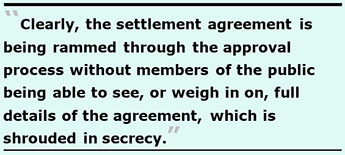 Clearly, the settlement agreement is being rammed through the approval process without members of the public being able to see, or weigh in on, full details of the agreement, which is shrouded in secrecy — despite multiple public records requests, including two records requests placed by the Westside Observer. The agreement will be heard next by San Francisco’s Board of Supervisors.
Clearly, the settlement agreement is being rammed through the approval process without members of the public being able to see, or weigh in on, full details of the agreement, which is shrouded in secrecy — despite multiple public records requests, including two records requests placed by the Westside Observer. The agreement will be heard next by San Francisco’s Board of Supervisors.
City Attorney Chiu participated in a Zoom call with members of the San Francisco Gray Panthers advocacy group and other invited public health advocates on Monday, October 17 prior to the Health Commission’s meeting. He did so because City officials were concerned about whether the Gray Panthers would support the settlement agreement. It’s not known if City officials were worried about whether other community groups would support the settlement agreement.
Unresolved Issue: Eliminating 120 Beds
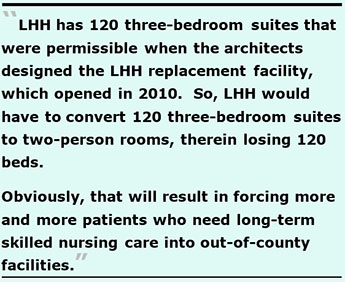 To put this in context, CMS had adopted a new rule in 2016 requiring that any new skilled nursing facilities built after 2016 applying to obtain CMS provider participation reimbursement agreements could only have two-person bedrooms. When CMS then decertified LHH and LHH began trying to apply for re-certification, CMS asserted that because LHH was starting over as a facility seeking new admission to the provider participation program, it was considered to be a new facility that would be held to the 2016 two-person new rule.
To put this in context, CMS had adopted a new rule in 2016 requiring that any new skilled nursing facilities built after 2016 applying to obtain CMS provider participation reimbursement agreements could only have two-person bedrooms. When CMS then decertified LHH and LHH began trying to apply for re-certification, CMS asserted that because LHH was starting over as a facility seeking new admission to the provider participation program, it was considered to be a new facility that would be held to the 2016 two-person new rule.
LHH has 120 three-bedroom suites that were then permissible when the architects designed the LHH replacement facility, which opened in 2010. So, LHH would have to convert 120 three-bedroom suites to two-person rooms, therein losing 120 beds. Obviously, that will result in forcing more and more patients who need long-term skilled nursing care into out-of-county facilities, adding up to hundreds of patients every few years.
During the Zoom call with the Gray Panthers prior to the Health Commission’s meeting, in response to a direct question about CMS’s insistence that LHH permanently eliminate 120 beds, Chiu would only meekly hide behind saying that the settlement agreement is “silent on the issue.”
City Attorney David Chew and the full Health Commission both had to have known — had the Commission been reading Chew’s Federal lawsuit and his three appeals — that had Chiu prevailed in forcing the CDPH survey findings and cited deficiencies to be reversed and rescinded, and had he prevailed in overturning LHH’s termination as a CMS provider, de-certification would also have been overturned. That, of course, means LHH would not need to apply for re-certification at all (which Chiu had alleged in his Federal lawsuit) and would not now need to be held to the two-person bedroom 2016 rule as a facility applying to become a new CMS provider participant, which would prevent having to eliminate 120 beds at LHH.
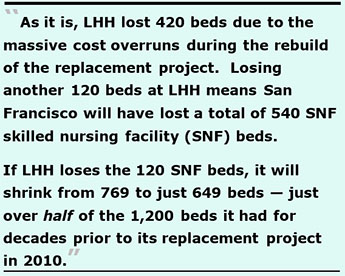 As it is, LHH lost 420 beds due to the massive cost overruns during the rebuild of its replacement project, and went from the planned 1,200 beds designed to just 780 beds when it opened. Losing another 120 beds at LHH means San Francisco will have lost a total of 540 SNF skilled nursing facility (SNF) beds at the LHHs campus alone, out of an already acute shortage of SNF bed capacity in-county, forcing more people into out-of-county placements. If LHH loses the 120 SNF beds, it will shrink from 769 to just 649 beds — just over half of the 1,200 beds it had for decades prior to its replacement project in 2010.
As it is, LHH lost 420 beds due to the massive cost overruns during the rebuild of its replacement project, and went from the planned 1,200 beds designed to just 780 beds when it opened. Losing another 120 beds at LHH means San Francisco will have lost a total of 540 SNF skilled nursing facility (SNF) beds at the LHHs campus alone, out of an already acute shortage of SNF bed capacity in-county, forcing more people into out-of-county placements. If LHH loses the 120 SNF beds, it will shrink from 769 to just 649 beds — just over half of the 1,200 beds it had for decades prior to its replacement project in 2010.
LHH’s acting CEO, Roland Pickens, suddenly started referring to the two-person bedrooms issue during the Health Commission’s October 18 hearing as being an issue involving two-person bathrooms, rather than bedrooms. The sudden change to referring to it as a bathroom problem wasn’t explained, and none of the Health Commissioners asked about it.
Unresolved Issue: Blocking New Admissions
Chiu may not have informed the Gray Panthers and other invited healthcare advocates during the October 17 Zoom call that the proposed settlement agreement is probably also “silent” on resumption of new admissions to LHH. Still, that appears to be the case because CDPH’s Press Release and media coverage have made no mention about whether the settlement agreement will allow new admissions to resume, assuming the Board of Supervisors approves the settlement agreement.
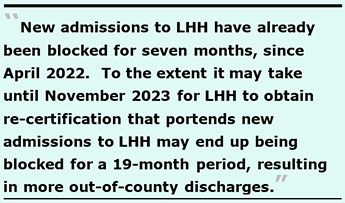 New admissions to LHH have already been blocked for seven months, since April 2022, because CMS has refused to pay for Medicare and Medicaid new admissions through the DPNA penalty when CMS decertified LHH. LHH has apparently not sought other sources of funding reimbursement (including supplemental City or State funding sources) since April 14. To the extent it may take until November 2023 for LHH to obtain re-certification — given LHH’s slow progress for readying is staff for CMS and CDPH reinspection surveys — that portends new admissions to LHH may end up being blocked for a 19-month period, resulting in more out-of-county discharges.
New admissions to LHH have already been blocked for seven months, since April 2022, because CMS has refused to pay for Medicare and Medicaid new admissions through the DPNA penalty when CMS decertified LHH. LHH has apparently not sought other sources of funding reimbursement (including supplemental City or State funding sources) since April 14. To the extent it may take until November 2023 for LHH to obtain re-certification — given LHH’s slow progress for readying is staff for CMS and CDPH reinspection surveys — that portends new admissions to LHH may end up being blocked for a 19-month period, resulting in more out-of-county discharges.
Both the 120-bed reduction problem and the halt of new admissions to LHH are reportedly resulting in a backlog of patient discharges from SFGH at great expense for an acute care hospital, and preventing new admissions to SFGH.
Unresolved Issue: LHH Nursing Home Administrator
As the Westside Observer reported on June 5, 2022 the last time LHH was run by a licensed Nursing Home Adminstrator (NHA) was 18 years ago in 2004 when Larry Funk was LHH’s CEO between 1998 and 2004. Funk was replaced in 2004 as CEO when he and LHH doctors began opposing the “flow project” of placing younger, able-bodied behavioral health patients from SFGH into LHH in an act of expedience due to the lack of behavioral health beds and facilities in San Francisco, even though LHH was not equipped and adequately staffed to provide the appropriate level of care to behavaioral health (mental health) patients.
LHH has been under the thumbs of SFDPH and SFGH management ever since 2004, with disastrous results.
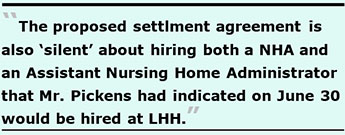 The proposed settlment agreement is also “silent” about hiring both a NHA and an Assistant Nursing Home Administrator that Mr. Pickens had indicated on June 30 would be hired at LHH. The Health Commssion didn’t disclose whether it is taking action to fill the NHA and ANHA positions at LHH quickly, since nursing home administrators are licensed to be experts on following CMS regulations governing skilled nursing facilities.
The proposed settlment agreement is also “silent” about hiring both a NHA and an Assistant Nursing Home Administrator that Mr. Pickens had indicated on June 30 would be hired at LHH. The Health Commssion didn’t disclose whether it is taking action to fill the NHA and ANHA positions at LHH quickly, since nursing home administrators are licensed to be experts on following CMS regulations governing skilled nursing facilities.
The flow project must be ended. And the settlement agreement must include hiring of the NHA and ANHA positions.
The Board of Supervisors and the Mayor must take action to budget for, prioritize, rapdily hiring the NHA and ANHA positions!
Other Unresolved “Silent” Issues
Although members of the Health Commission may have received information on other unresolved issues during its closed session meeting on October 18, the public has not been formed about other significant issues.
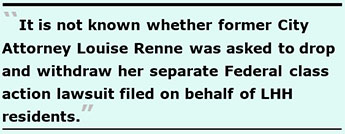 First, it’s not known if the S203,885 payment the Health Commission agreed the City will have to pay to settle Chiu’s Federal lawsuit is a new additional fine, or whether Chiu was able to negotiate downward the $409,000 fines and civil monetary penalties CDPH and CMSA had previously assessed against LHH. The public deserves to be told the truth about this significant issue.
First, it’s not known if the S203,885 payment the Health Commission agreed the City will have to pay to settle Chiu’s Federal lawsuit is a new additional fine, or whether Chiu was able to negotiate downward the $409,000 fines and civil monetary penalties CDPH and CMSA had previously assessed against LHH. The public deserves to be told the truth about this significant issue.
Second, it is not known whether former City Attorney Louise Renne was asked to drop and withdraw her separate Federal class action lawsuit filed on behalf of LHH residents. It’s not known whether the Renne Public Law Group has been asked to drop its own lawsuit as part of the settlement agreement Chiu reached.
Finally, the San Francisco Chronicle reported on October 13 that Chiu claimed “the settlement also includes a new [important] dispute resolution process [for the future] to avoid the kind of crisis that Laguna Honda and its regulators landed in this year.” Unfortunately, no details of any proposed new “dispute resolution process” has been made publicly available, and it’s not known if the Health Commission was briefed on any new dispute resolution processes during its October 18 Closed Session briefing by the City Attorney. It’s hard to believe Chiu’s withdrawn Federal lawsuit would have pushed CDPH or CMS into issuing any new rulemaking efforts or dispute resolution regulations.
San Franciscans, and the City’s most vulnerable residents relying on Medicaid for their healthcare coverage, are being greatly disadvantaged by not seeing full details of other potentially “silent” provisions in the settlement agreement before it is adopted and enacted by the Board of Supervisors and Mayor London Breed.
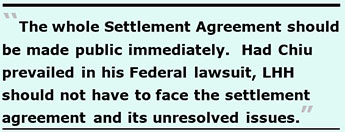 The whole Settlement Agreement should be made public immediately. Otherwise, the Board of Supervisors will be voting on it without input from an informed public.
The whole Settlement Agreement should be made public immediately. Otherwise, the Board of Supervisors will be voting on it without input from an informed public.
Chiu first asserted LHH should not have to face re-certification, Had Chiu prevailed in his Federal lawsuit, LHH should not have to face the settlement agreement and its unresolved issues, either.
Monette-Shaw is a columnist for San Francisco’s Westside Observer newspaper, and a retired City employee. He received a James Madison Freedom of Information Award in the “Advocacy” category from the Society of Professional Journalists–Northern California Chapter in 2012. He’s a member of the California First Amendment Coalition (FAC) and the ACLU. Contact him at monette-shaw@westsideobserver.com.